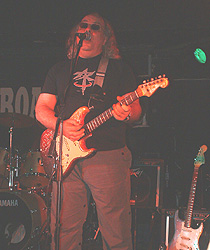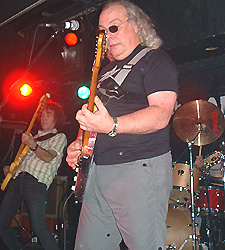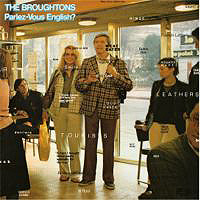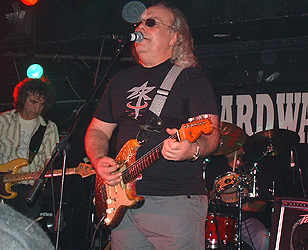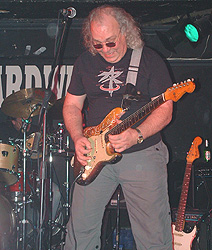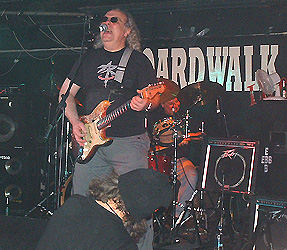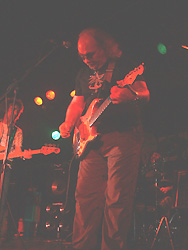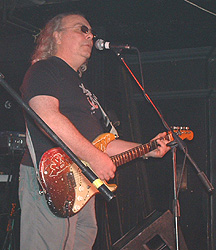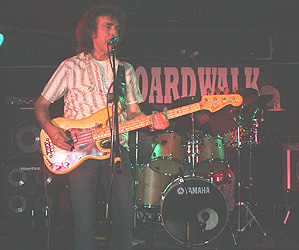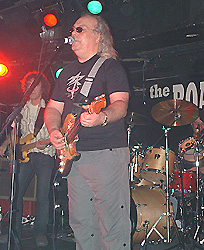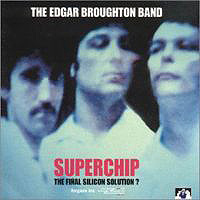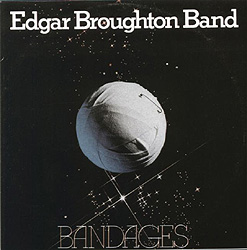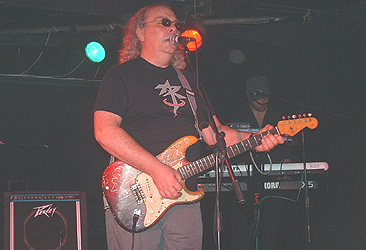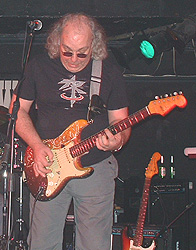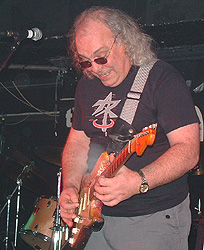|
An Interview with Edgar Broughton of 'The Edgar Broughton Band' via telephone on 9th April, 2006 by Glenn Milligan
Glenn: How have the gigs gone in the UK that you did recently? Edgar: Brilliant. Absolutely fabulous - in fact they went a lot better than we expected really which was a great surprise. We put a lot of work in. We started rehearsing in November so we were really, really on it but we were still surprised with the reaction and the numbers of people - it was great. Glenn: The Boardwalk gig (in Sheffield) was amazing. Edgar: Oh you liked that? Glenn: Yeah, it was like what I put in the review, that it was like you've never been away - it was like you've constantly been gigging all the time. It was just so tight. Rob: Which is quite unusual for us really because when we first got back together it was like 'Oh god, what are we doing?', you know? Glenn: Yeah. Edgar: Nobody remembered anything - well I didn't anyway. (we laugh about the fact) Glenn: When you've been doing these last few gigs, what have been your favourite songs personally? Edgar: Well 'Refugee' was one. The sampled tympani drums in the unaccompanied stage. I enjoyed the sort of joined together bit of 'Speak down the wires'; 'The Moth' and 'Why can't somebody love me'. I also really enjoyed doing our kind of new version of 'The Exorcism' at the end which was slightly more meaningful than in those days. Glenn: Yeah. Edgar: Different nights I like different things. It was good fun doing things like 'American Boy Soldier' again. Glenn: When you brought in the new lyrics about Iraq and that? Edgar: Yeah. Glenn: It was brilliant how you put all that together and made it all work. Edgar: Well it was strange really because when we looked at doing this, I looked at the list and I said, 'Hey, we've got omissions here, we can resurrect 'American Boy Soldier' because there's a war going on and it's another American War - another pointless stupid American war except this time we've been inviegaled into it as well. Glenn: Outside of the gigging, how you been rehearsing and getting together now and again? Edgar: No. I've been working on some songs I suppose which is kind of an album with my son for years, for about 7 or 8 years now and we've got a little studio at home and we've got some good equipment - it's fantastic that you can have hard disk recording that's as good as the Studio at Abbey Road when we first went there. You can actually go in a shop and buy that kind of quality now.
Glenn: Yeah, it's good. Innit? Edgar: Yeah. So we've been working on some distinctly quite different stuff as well as sort of trying to keeping in touch with what the band always did. So we've been writing and
we've got about, I don't know, 30 songs, probably about 10 of which
we like and then what happened was EMI decided to re-release some stuff
and there was some stuff that they did that they weren't really interested
in - the sort of the back end of it that included things like 'Parlez-vous'
and 'Superchip' and there was a live one and a couple of other bits
and the guy who kind of actually - it's what he does really, a guy called
Mark Powell at Eclectic. One of his things is, he puts old catalogue
together in an new and interesting way and he's very, very good at it
- as evidence by all the new sleeves that they did and how they
Anyway, they did this thing for EMI and we all met up and went down to Abbey Road again and we actually had it re-mastered by a guy called Peter Mew who was on our very original recordings when we went there really green into the middle of Abbey Road. So it's a real kind of nice reunion and in the course of doing this we.. I suppose the thing came up. 'Oh it'd be great to see you guys back together on the road again and 'yeah, yeah' and all that business and then some time later they got in touch and said 'Look, these four albums that are kind of yours, (in other words ours now) what do you wanna do about 'em.' We said, 'Well, what do you suggest?' and they suggested that they did personal re-release as it were, the company themselves, Eclectic and then of course they said 'Do you fancy doing some gigs? And we said, 'Under what kinds of conditions?'. We were a bit kind of, I suppose the word is not 'suspicious' but you know, 'careful'- we didn't want to go 'half-good'. So they came up with the goods really and they've been great really. They've made sure everything was advertised at the level that we're at - it was reasonable. Of course it showed and people showed up. Glenn: I know, I was so impressed, I thought when I went to the Boardwalk that night that it's either gonna be a real crap attendance or it's gonna be real good and it was really, really good and I think Chris (Wilson - the Promoter of the venue) thought the same, it's either gonna be one way or the other but it all came out right on top. It was excellent. Edgar: Yeah, in some ways that was probably my favourite gig because. The 100 Club was good in London because it was full and there were a lot of our friends there but there's something about Sheffield - it's a great place and it's obvious there's a great scene there. I mean, we met this guy, I don't remember his name now but he's a big youngish guy who plays tech-metal - he's got a kind of like oriental moustache and a top-not haircut and tattoos and a lovely bloke and he was telling me all about the band scene in Sheffield because he's in the tech metal band and he was just talking to this one guy and Chris of course, it comes across that this is a real happening town - it always was - with lots of art and culture - proper northern culture and I think that came across in the audience and I think it does you know. It's not like you can't tell if people are happy in there lives or anything at a gig. You can tell, I don't know, but you can tell if they spend time listening, really perhaps, you can tell if they are community minded perhaps sometimes and by when we chant and what response you get and if they are political of course. So in a way it was one of my favourites. We didn't wanna leave Sheffield really, it was quite strange - of course we played the same on each night but when we left it was a bit odd really. Glenn: Yeah, I mean you went down so well. I notice when you go to a gig anywhere and you get to a quiet part -like just a vocal or an acoustic section or something, you get people talking and that really annoys me - but when you were playing a quiet section, it was like you could have dropped a pin on the floor and you'd have heard the pin. It was incredible. Edgar: Yeah. Glenn: And it was really good that you managed to get that because I've never known that happen before. Edgar: Right. Glenn: It's amazing. So you'd love to come back to Sheffield again. Edgar: Oh yes. We intend to. I'd love to play The Boardwalk. Glenn: I mean Chris said how much he loved the gig and that it was like a magical night for him. Edgar: Brilliant. That's what we like. I mean, when everybody's happy, that's great - including the promoter, journalists who might be there, road crew - that's fabulous. I mean we had a guy with us called 'Scampi' who did all our backline and drove us and everything - we've never met him before and at the end of it all he said, 'I don't work with anybody else, this is great, you ain't going abroad without me again.' Because we had to go to Germany and do this TV thing. We hadn't sort of planned anything really for a roadie and he was already going off with another band that week. So it was nice to have people that were from Eclectic, people like yourself, Chris at the club - across the country really into the band that were there without any really big hype. That was really a nice outcome.
Glenn: Yeah, I mean I knew about you coming, my mate Martin (Bellamy) said, 'You'll never guess who's comin' 'Edgar Broughton' and I'm like 'Christ you're jokin'?, I didn't know he was still around' sort of thing. Edgar: Ha Ha Ha. Yeah, we had people coming op and sayin' 'We thought you were dead!' Like it is funny. Glenn: Well I thought you'd be around doing something like outside music or whatever because a lot are but what like 'Oh, you're joking?' As I was saying to you that night of the gig, 'I remember seeing you guys when you were on Beat Club from about 1970/71 with big hair and the beard and everything. Edgar: Yeah, Yeah. Oddly enough, we've just done Rockpalast in Germany last week in fact - we were over just to do that and it's a live gig and at the moment it takes place in a club called 'The Harmony' in Bon and obviously the club is put together for TV and it's a really nice place to play. But there was a band on from Sweden called 'Sienna Root' and they were kind of in their sort of 20's - mid 20's and they don't play anything after 1975 or listen to anything. They're not interested in anything after 1975.
Glenn: Wow. Edgar: So when we finished they were in the dressing-room and they were like 'Wow' because as far as they're concerned, we're the real thing and we're like still doing more or less what we did then - certainly on this tour it was all old numbers and that was kind of interesting because again they'd got this kind of idea .. they hadn't seen anybody for a couple of years who was actually playing back then who is still playing now. And that was interesting, you know, to listen to their kind of evaluation of it all, like they got a girl singer and she was really sweet and she said, 'Oh, it was really interesting, the kind of funk music and blues and some opera' and I'm going 'What?'. And again that's kind of like what the variety of stuff that we do is like and we were saying, 'Well back then you know, that's what bands were like - it was really out there - it was a variety of stuff. Glenn: Exactly. Edgar: But interesting that you mentioned 'Beat Club' and there we were only a couple of weeks ago back there doing something that we hope will have the same kind of usefulness to people that those early tv things did have. Glenn: What do you remember most when you first got together as a band and what would you say turned you onto that unique style that you've got? Edgar: I don't know really.
When we first started we were kind of a blues band - that's the only
time we ever sort of played any kind of covers - like deep urban blues
or city blues and some country stuff. We really were a dirty old blues
band back in the days when people like John Mayall had people like Eric
Clapton and Peter Green playing among him - we loved all that - Paul
Butterfield - that kind of stuff. So we were a kind of blues band really
and then I think it was one Thursday evening, we all turned the telly
on and saw Jimi Hendrix playing 'Purple Haze' or 'Hey Joe' and it was
transforming and radically revolutionary. We had a guitarist at the
time called Vic Unit who left purely on the grounds that if we were
gonna move But I've always had an interest and didn't realize it, a kind of interest in World Music - drones and chants that crossed the borderline if you like. So there was some music once on the earth that you could have heard in Phonecia before they went to cornwall and mined the tin. You could have heard it in Britanny and certainly in the north of Scotland, in East Anglia and Scandinavia, probably India, you know a kind of music that just travelled around with the people who travelled that were merchants or soldiers - and it's still around you know, every now and then you hear something. So that always fascinated me and yet when we looked at the folk scene - cause Vic, the guitarist and me we used to sort of hitch hiked around in the Kerouak vein with an acoustic guitar and a harmonica and just turn up and be floor singers at folk clubs and hope that somebody took you home for the night and take you to bed - which they did - especially back in those days. But what I did think about that whole folk thing was, was that it was a bit of a museum and I didn't really wanna be a folk artist. I liked some of the stuff very much but it all seemed somewhere where middle-class people turned up in tweed jackets, slung a pint of beer from left to right - do you know that kind of thing?
Glenn: Yeah, you've got it around here where I live with its own folk club and its like going back 50/60 years - like Pete Seeger returns sort of thing. It's like, 'Oh god, I mean, chuck some new style in at least'. Rob: Yeah, I mean to me, people like Billy Bragg are folk singers, The Clash were folk singers - do you know what I mean? Glenn: Yeah. Edgar: So I think that kind of being slightly sort of adoring some of the forms of music and yet rejecting it really and not really wanting to stay a blues band. I suppose we started to write like a hybrid kind of music. So things like for e.g. 'Speak down the wires' and 'The Refugee' certainly havea kind of bluesy folk thing to them and yet other things are far too brash and loud to be called that. I think our music is very English in a way but it's got lots and lots of blues in it. That's it really - it's kind of like a folk band with this big sort of electric injection in a way. Glenn: Yeah, I mean when I was watching I stood there thinking there's so many elements (to the sound and style). I was thinking Frank Zappa, Bonzo Dog Doo Dah Band. Edgar: Yay, yeah ! Glenn: Dr. John -Night Tripper period, Mountain, little bits of (Black) Sabbathy sounds creeping in, Pink Floyd - it was all there but it was all done in your own unique style and you couldn't pinpoint the band - it's The Edgar Broughton Band sound. Edgar: Well we didn't nick that stuff but we've certainly listened to that a lot. We've been influenced I suppose - a huge variety of stuff. I mean one of my favourite all time bands is The Shads (Shadows). I absolutely love them and we do this kind of little instrumental thing before 'Dr. Spock' -it's like a tribute to Dr. Spock, the baby Doctor and there's a little song, only two verses after a kind of Floydy instrumental but when I listen to it I realize it's much more Hank Marvin than it is Gilmour, Syd Barrett and while we were on the bus on this tour actually we watched this Shadows DVD of a concert of their farewell tour in Wales and what was extraordinary was they did about half an hours worth of songs and they were dreadful - I mean really awful. They could never do that and then they'd go back to these wonderful instrumentals. But I don't know if you've ever heard it - we did a thing called 'Apache Drop-out'.
Glenn: I don't think I've heard that. Edgar: No. Well it's basically two songs fused into one - it's Apache by The Shadows and 'Drop-out Boogie' by Captain Beefheart. It starts with 'Drop-Out Boogie' and just falls away and goes into the 1st part of 'Apache', then the 2ns and 3rd part. I mean, that's I suppose as as mad and extremely boldy-like amalgamated as we ever were. But funnily enough one day we were in Studio 2 in Abbey Road and the Engineer Pete Mew said he'd 'arranged for Hank Marvin to drop in while we were mixing it' and I was mortified at first because in a way I thought he'd think this was a p*ss -take but he was actually really nice and he said to me, "Oh I'd have lent you my tape echo unit if I'd have known"', you know, stuff like that. Glenn: Yeah. Edgar: So we've had a checquered career really. We've met all kinds of people and joined all kinds of bits of music styles together really - but that's probably the most extreme example. Glenn: We did a lot of free gigs and stuff. Edgar: We did. Glenn: Is that because you thought, well music's out there, we wanna be out there as such and we just wanna get the thing across' or was it because everyone was doing the free gigs and stuff? Edgar: Well we did so many free gigs and free concerts that bands used to sort of like bump into us on the motorway and say, "Hey, you guys have gotta stop this man - you know you'll ruin it for everybody and people won't pay anymore" and we'd say, "Oh, don't talk stupid." I mean, if anything it did cost us because the more times you play of course, you can only play so many times before people don't wanna see you. The idea of maybe going to The Boardwalk once a year makes sense - but four or five times a year then you know people will obviously say, "Well I've seen 'em twice already this year".
Glenn: Exactly. Edgar: But of course when
we were doing free gigs that was one of the outcomes and one of the
effects. But really, the truth is, we did it because we believed in
- we felt we were kindly well, well off in a sense. I don't mean we
were rich because we weren't but compared to guys that we knew that
were still working on the roads or building sites or factories where
we come from, we thought we were in heaven. So we wanted to put something
back - the old, old chestnut really but instead of just saying it -
we did it and the trouble was whenever the phone rang we said, 'Yeah,
we'll do it' to such an extent that in the end we had to start saying
to people, "You're gonna have to pay us the fee and then put that
to the cause' because otherwise people would say, "Oh yeah, we
got The Edgar Broughton Band - it'll be a great Glenn: And before you know it, you're working every night and it's like "Hang on, it's costing us a fortune in running costs". Edgar: And sometimes people didn't even bother to raise the money they were supposed to do. But having said that we raised thousands for a Bangladesh appeal once and we also did a big thing in Sheffield City Hall which was the 1st gig towards setting up the UK Prisoners Benevolent and Support Fund. So to look back on some of those things as well as doing lots of benefits to all kinds that didn't necessary maybe achieve very much - but some of 'em did - some of 'em were really, really important things to do. So I don't regret it really although we did do too many I think for our own good. Glenn: What was it like originally when you first fist signed to EMI? Was it like, "We are signed to the biggest giants of the recording industry' ? Was it like, "Wow, we've made it now we've got EMI behind us? Edgar: Well it was a bit like that. We came down to London from the Midlands and stayed with some friends in a flat in Colville Terrace in Notting Hill Gate. We were sort of. well the thing is, we were sort of really easy identifiable as a band - we went out of our way to look as band-like as we possibly could. Our idea of kind wandering around on a Saturday afternoon to hear all these old ladies say things like, "My god, I hope my grandchild never……." and all this sort of stuff.
(I laugh) You know, beads in our hair, bell-bottom trousers with real bells on painted up and everything. So there we were sort of hanging out in Notting Hill Gate. Of course, you'd only have to look at us and go, "Oh, they must be a band". Anyway, this guy came up and said, "Do you know there's these people who used to manage 'The Pink Floyd' not far from here, just down the road". I said, "No never heard of 'em", "We'll they're called 'Blackhill Enterprise'. So we all wondered in there one afternoon and Pete Jenna who became our Manager was supposed to have a band on at Imperial College at the back of The Albert Hall and the band couldn't do it so he said, "Do you wanna play there?", so we said, 'Yeah, yeah, we'll play' and I remember playing with Duster Bennett the blues guitarist cos I broke a string and had to borrow his stereo Gibson and he was a bit concerned that I might trash it, I think. But anyway, I remember the gig really clearly - we blew everybody away and Blackhill signed us the next day. Glenn: WOW ! Edgar: Well it just so happened that Pete and Andrew, the main partners were right in at the very end of negotiating a deal with 'Harvest' who an EMI label. 'Harvest Records' was gonna do all that sort of underground stuff like Third Ear Band, Kevin Ayers, Pete Brown, Pink Floyd and so on - Roy Harper an endless list of people who I suppose would never had got that gig if it hadn't have been for Harvest and Blackhill and people like them. So our timing was absolutely superb.
Glenn: Yeah. Right place, right time, right clothes, right look. Edgar: That's it really. Pete said to me, "I've never seen anything like you lot. You just destroyed the audience." So that was it - that was the start of a long and happy sojourn with Blackhill really - Blackhill Enterprises. Glenn: Got ya. What would you say are some of your favourite gigs of that period are? Edgar: Well I suppose we've got to cite the gig we did with Blind Faith in the Park (Hyde Park). Blind Faith was sort of (Eric) Clapton, (Ginger) Baker and a few others. They'd all been in different things and they wanted to form what was in fact called 'The First Supergroup' - Blind Faith and we were playing with 'em. I think we played to 140,000 people. Glenn: Christ ! That's a lot innit? Edgar: Absolutely stunning. In the park - that was for free. Then there was the Isle of Wight - we did that with Bob Dylan and I suppose there was all the big free festivals and all the big paid festivals that we did, including the 1st Glastonbury were all great - they were fantastic. I mean, for us, it was what we'd dreamed of. Getting up in the morning, going to sit in a car for half a day and going to play for some lovely people - they were good times. Glenn: So you knocked about with all sorts of famous people at the time. Edgar: Oh yeah, I mean one night, I mean, I've got a guitar, yeah - the painted one that you probably saw me use? Glenn: Yeah. Edgar: That used to be the old salmon pink and I bought it for £50 from a local music shop in Warwick in Warwickshire. Well Eric Clapton borrowed that for a gig at The Roundhouse, Peter Green played it, Syd Barrett played it at a jam session in All Saints in Notting Hill Gate. Even our equipment has seen some fantastic moments but in those days there used to be a club for example in London called The Speakeasy in Margaret Street and we used to go down there quite often when we weren't working. It was the one place, I suppose where we went socially that you might expect a band to go to. But you used to see everybody down there constantly, everybody went and there was very little, there was no little one-upmanship - people were so nice to people - they were friendly. Glenn: None of this precious rock star crap that you often get? Edgar: Yes. There was almost none of that then. Well there was a couple of people - Gary Glitter was one of them. I don't know who he thought he was but he always, always had a bob on himself. He always ignored his band - he always stayed in a better hotel than them - I mean we thought he was an *rs*h*l* then. Glenn: Yeah and look at him now. Edgar: You know what I mean. I know people that worked with him in a very low-level peripheral level who hate the fact that they did anything for him now. They were completely obviously clueless about his true nature. Glenn: Yeah. Anyway, you played a gig with Motorhead - how was that? Edgar: Well we often use to see Lemmy quite often. Again, he was someone you'd bump into at all kinds of gigs. I remember nearly always his first response when he saw me was, "Hello Edgar, you got any speed?" That was Lemmy you know?
Glenn: Yeah. Edgar: And I'd say, "No, no mate", and he'd go to somebody else. Glenn: That was him all the time then? Edgar: Oh yes, yes. A good bloke though, good bloke. Glenn: Yeah I met Lemmy a couple of times, I interviewed him and he's an absolute straight shooter - what you see is what you get. Edgar: Yeah, yeah - he's cool. Glenn: Where did some of the pictures on the website come from? Like pictures in a living room, in a shipyard. Edgar: Oh yeah, I mean there just some of the pictures that you collect over the years. I was gonna say hundreds of years (we laugh). Hundreds of pictures over the years and I don't even know who or why anybody chose them. There's so many to choose from. They'll probably get rotated anyway at some point. Glenn: Is it like a family unit in the Edgar Broughton band. Edgar: Well it is, more so now of course. It's interesting - on the London gig we actually as well as my son Luke on keyboards and my brother on drums, we had Steve's son Sonny playing guitar with us and he's only 10. He's been playing guitar for a very short time. I thought, 'There will be great photographs in this' and also we had Arthur's (the bass players) son, doing the lights, so it really was on that night, actually quite - quite a family affair and of course Arthur is family virtually anyway - we went to school with him and certainly Steve did. We knew him very well back on the little estate we lived in Warwick. So he's played with us as long as we've played really virtually. Andrew who was playing guitar with us at the time - well we've known him years and years and years - it's 20 years since we last played with him but he's helped me as well. He's just one of the gang really. Glenn: What would you say are some of your all-time favourite albums that you've released yourselves? Edgar: That's tricky really because I don't think I can pick. I like Superchip - I like Superchip because we made that for ourselves - probably not the best policy - I mean, certainly you wouldn't allow a new band to do anything like that. But after all those albums, that was something that I really wanted to write and sort see actualized. The extraordinary thing about that album is if you listen to the lyrics and just take the sense of at least 4 or 5 of the songs - they were prophetic - things that were science-fiction in 1980 when we actually made that album have come to path. We use all kinds of phrasing - glibly like the collapse of international banking systems; putting chips in peoples heads - it's all come to pass. Lots of other things as well. So I like that album for that and I like it for its sort of semi-electronic techno thing.
I like 'Bandages' for its kind of pastoral sort of feel. Obviously I like the first album because it was the 1st album but there are bits of it that I can hardly listen to these days because it was flawed - it was great but it was flawed. So I don't know if there are any albums really but there's a collection of songs that we all have a best of that we would make out of all of them - so I like bits of all of them really.
Glenn: Would you say that they are often the ones that you would put into your live set? Edgar: Yeah. I mean I think we played most of 'em on the last gigs. I think that that was a collection that we all said, "Let's do this" or "Let's do that". So I suppose in a way that was kind of perhaps the band's best of list - so yeah. Glenn: Are you still a youth worker now? Edgar: Yeah. We run a little project in Battersea with a couple of studios and a dance space with mirrors and stuff and whereas we were a kind of generic youth club we are much more of a sort of performance orientated kind of set up now. Mostly working with kids spitting lyrics over hip-hoppy garage kinda tunes - most of which is extremely boring but of course the point is that they come in there, we get to meet them and maybe exchange ideas with them and maybe plant a seed of something they haven't thought of. It's often not just about making music. Glenn: Do you ever say, "I'm in a band called 'The Edgar Broughton Band' ? Edgar: No I never say it. Glenn: You never mention it. Edgar: No. They know that we, Luke works there as well, are musicians and they know that from the fact that we help them make music sometimes and that we know how to work all the equipment in the studios. But it's quite strange - we've run a youth radio station from there for 9 years every summer and it was the 1st Youth Radio Station run by young people in the country. That was quite good and the 1st year we actually won the Philip Lawrence award for Crime Prevention.
Glenn: Excellent. Edgar: So that was a nice project but in the middle of that towards the end some guys came in and said 'Rob, 'ey what you up to, I listened to this cd, there's this remix by this guy called David Holmes, this Irish DJ and you're on his album. So they kind of knew about us in various ways. So it was quite interesting that day because there we are suddenly on this remix double album that's fast becoming a very well known and international acclaimed DJ from Ireland, which was quite flattering but even more exciting that some of these kids of course would know about it because they were right into their DJ'ing at the time. I think this was slightly pre-garagey so we are coming to the end of the sort of hardcore drum and bass and the very tail end of jungle and stuff. Good days. Glenn: Yeah, I remember all that way back in my college days. Edgar: There was some good music being made by young people back then - really good. It still is but it's a bit of a dormant time for dance music at the moment. In some ways the bands are coming back.
Glenn: Yeah, I was only saying that to a mate of mine the other night, that you can go and see a live band all over now but a few years ago it was all backing tapes and whatever else. Edgar: Yeah. But of course that'll re-generate the dance scene again well. The trouble is when you sort of . well the 90's was virtually a remix. The 80's didn't look much until we've left the 90's behind and now the 80's looks a lot better if you know what I mean. Glenn: Yeah. Edgar: But the 90's - very little good stuff really. Very poor - apart from stuff that was really stand-out stuff - you know, really different stuff? Glenn: Yeah. Edgar: You know every time Bjork sneezes as far as I'm concerned she makes a lovely sound. (I laugh at the fact.) Edgar: So you would always get the odd album through any ten years that makes it a great ten years. Not really a good time though. Glenn: I hated the 90's - it just killed a lot of music and all you get of the 90's is Oasis - I mean there was more than bl**dy Oasis in the 90's, get a life and see what's out there. Edgar: I agree. Glenn: When are you planning on touring again - will you be doing some more tours in Britain or are you going abroad? Edgar: Well we are supposed to be going to Norway at the end of May to do a couple of gigs and then I know we've got some gigs in the West Country - a couple of gigs in July all sort of coming together in bits and drafts and to be honest we are only picking stuff we really wanna do - although we get quite a few offers about. We're gonna be going back at some point to be doing some gigs which were sort of put to us during the Sheffield and York gigs as it were - a couple of promoters came from the Manchester and Leeds area, so we are gonna be doing that later in the year and then I think in September, hopefully on the back of this tv show we did for Rockpalast, Germany is on - hopefully we will go and tour Germany in September/October. So yeah, we're kind of back now in a small way and we expect to kind of build on that a little bit now and do a few gigs. Glenn: Got ya. Is it the same guy that's running Rockpalast like it was in the late 70's, early 80's - Peter Ruchel or whatever his name is? Edgar: To tell you the truth I don't know. I forgot to ask him if it was the same guy . I didn't remember him from before so it may we be . The guy might have a role in it still, but he might no longer actually turn up at the events and actually do the presenting. I think that may be the case but I could be wrong, I'm not sure. Glenn: Yeah, I remember when I had analogue satellite and I used to tune in and look forward to what was on Rockpalast that weekend. Edgar: Yeah. Yeah. Glenn: What sort of hobbies do you have outside music and the youth work? Edgar: Well I've always been a racing cycle fan because my dad used to be a bike rider. I ride a nice aluminium Bianchi with 120lbs per square inch in the tyres. I still can rattle on the roads a bit. I'm a bit big for being very quick these days but I like that - I like cycling. I'm just beginning to get into a thing called Iaido which is drawing a sword - it's a Japanese thing - a sort of meditational process and it's just about taking a sword out of a sheath and putting it back in - it's just about poise. Glenn: Got ya. Edgar: And then I go fishing. I'm a predator fisherman. I like pike fishing and perch fishing. So I do quite a lot of fishing. Glenn: I know, there's quite a lot of fishing around here. Edgar: I know, I was sad to leave especially since I didn't have a rod in my hand - still the seasons over mostly. Glenn: Yeah we got a nice Reservoir in Harthill. Edgar: Oh yeah. Glenn: There's two or 3 pikes in and plenty of carp. Edgar: Oh yeah. Glenn: There's loads of them. I've not been around myself for a while. Now the re-releases are out, do you plan to be releasing new albums? Edgar: Well as I say, we do have some songs but I don't when or how we are gonna actually finish them off and in what format. I suspect it'll be a mixture. I suspect it will be something that Luke and myself have put together and then I think that will be extended by something that we will re-work with the rest of the band and hopefully as the months progress through the year I guess we are gonna be getting' to look at that. To see what we are gonna do about that. So perhaps by the end of the year there will be a new one. Glenn: You are based in London now? Edgar: Yeah. Glenn: Do you often go out and check out new bands quite a bit? Edgar: Rarely actually myself, I must admit. I'm gonna see Depeche Mode with Luke in the Park, in Hyde Park in June I think. But that's a techno day - it'll be all kinds of things - Goldfrapp are on which we like. But I very rarely go see bands these days. I sort of watch a lot of MTV and stuff like that really. I sometimes buy albums of what I've read a review but I must admit I don't go and see very any bands these days. I never did much actually apart from when we playing. Glenn: You don't get chance do you really. Edgar: Not really no - we like to holiday away from it (laughs) Glenn: What was it like playing the 100 Club? Edgar: Oh that was fantastic - it's a little dive really in Oxford Street but it's not really special - only in so far as all the people that have played there. Glenn: Exactly yeah. Edgar: Full of vibes. But it hasn't changed very much - but it was full so that was really nice. It was nice to actually play a gig in London that I suppose all the people that wanted to see us in London came but also some families and friends and people we haven't seen for years and years at the time when the band was probably as cookin' as its ever been - so that was satisfying - not just to do a gig there but to do a really excellent gig that everybody really liked and remarked on. Yeah it was quite satisfying and then we had a few days off and we went to Germany for the TV so it worked out quite nicely that. Glenn: Yeah. Did you get interviewed for it (German Gig) or was it a straight gig? Edgar: Well you do a gig and then there's a sort of interview with everybody after and then I did a little acoustic version of 'Green Lights' like an unplugged thing. They do that sort of stuff really and it's all done on the one evening and it's actually quite well organized. Glenn: Did it take a long time to set up that up or did they just approach you and say, 'Do you fancy doing it?' Edgar: Well I think what happened was with the re-release of the last four albums, Mark Powell from Eclectic contacted them and said, "Look you know, we're gonna have 'The Edgar Broughton Band' up and running at this time, are you interested?" and they jumped at it. Obviously because we'd done it before and there was a kind of historic sort of aspect to it and also because I think, well within reason I think they'd always want to do 'The Edgar Broughton band ' on Rockpalast. So yeah. We didn't have to hustle (laughs). Glenn: It's amazing how the Germans, and places like that, they've kept that big live scene going. What I find amazing it that you get a lot of British bands or bands from all over the world that'll play there but yet we've not really got that in Britain. We should have this proper channel that's just set up for live concerts for like once a week or something. Edgar: I think what it is,
the difference is, not so much in the North of England I'm happy to
say but in most parts of what people who live there as sophisticated
UK and that's mostly the South with pockets elsewhere. It's very cliquey
and fashionable, so for example, you buy into a band in 2006, by the
end of 2008 you don't even remember where the cd is. Whereas in Germany,
you bought 'The Edgar Broughton Band' in 1968 and in 2008, you'll be
going Glenn: You seem to get that with people in Britain. It's like, "Oh I used to be into them but I've moved on from that" and I'm like "Look, if you were into them in the first place, you should always be into the band", why change because the scene and styles have changed 30 or 40 years on - it's just cr*p to me that. Edgar: Yeah. Absolutely. I mean we are much more fashion slaves really. In Germany they are truly eclectic and they listen to almost everything. Glenn: That's it isn't it. Edgar: So do most other places in Europe. Other countries in Europe have that Britishness I think. But in Germany, they like what they like and are very clear like that (laughs). It's a great place, I love Germany and the Germans and playing there. Glenn: Would you say that there's places that you'd still love to play that you've not had chance yet? Edgar: Yeah. Top of my list is Japan. That's where I wanna go. I'd love to play there. The trouble is, the band are really concerned about that because they say they'll never be able to find me because I'll just be stuck in some latest sword shop (we laugh at the fact). Glenn: Right, I'll let you get off but it's been brilliant talking to you.
Edgar: Oh it's a pleasure mate. A big thankyou
for Mark & Jayne @ Eclectic Records for setting this interview up,
Edgar himself and Chris Wilson of The Boardwalk venue in Sheffield,
where I met Edgar in the first place. |
